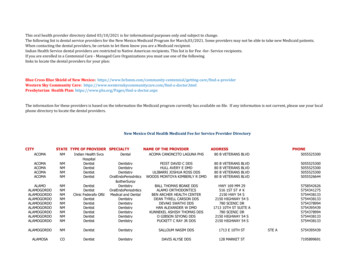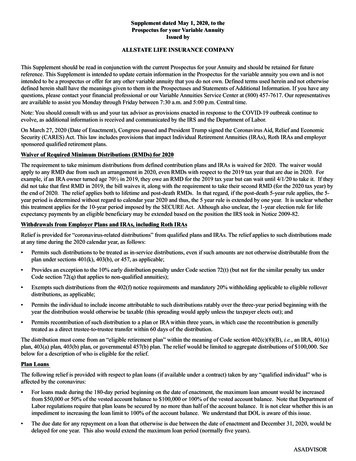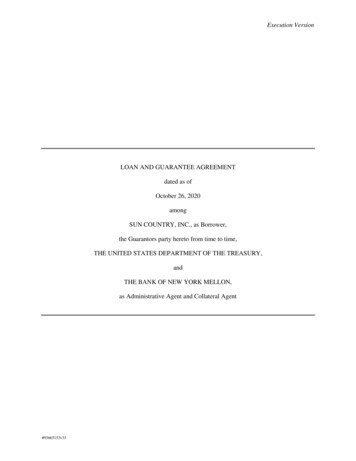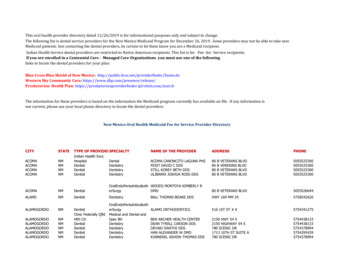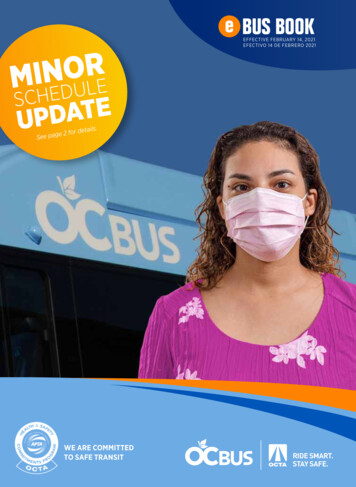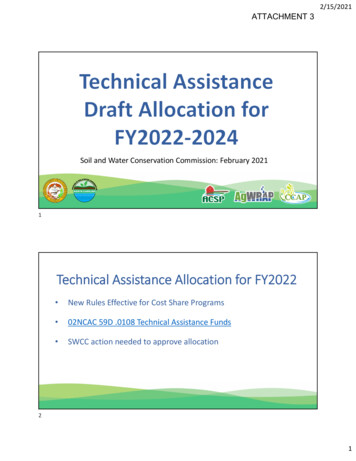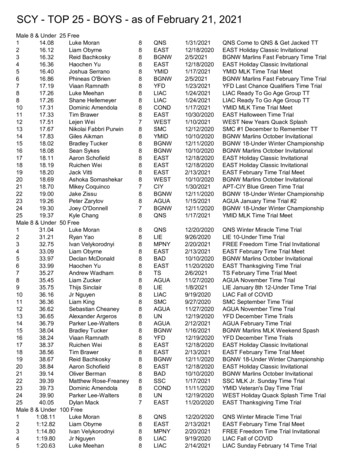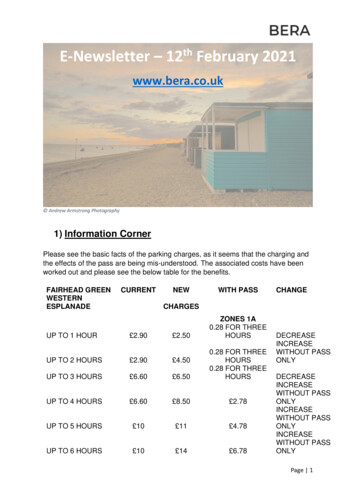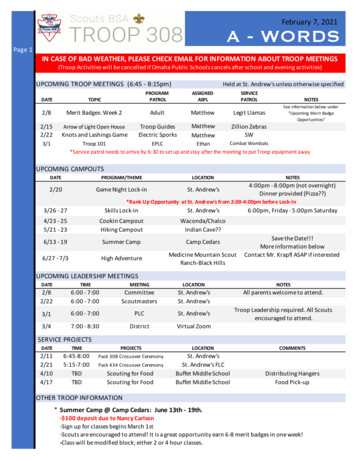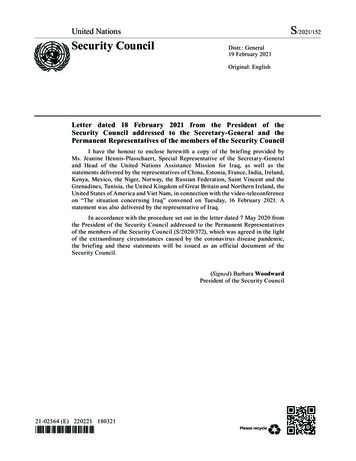
Transcription
S/2021/152United NationsSecurity CouncilDistr.: General19 February 2021Original: EnglishLetter dated 18 February 2021 from the President of theSecurity Council addressed to the Secretary-General and thePermanent Representatives of the members of the Security CouncilI have the honour to enclose herewith a copy of the briefing provided byMs. Jeanine Hennis-Plasschaert, Special Representative of the Secretary-Generaland Head of the United Nations Assistance Mission for Iraq, as well as thestatements delivered by the representatives of China, Estonia, France, India, Ireland,Kenya, Mexico, the Niger, Norway, the Russian Federation, Saint Vincent and theGrenadines, Tunisia, the United Kingdom of Great Britain and Northern Ireland, theUnited States of America and Viet Nam, in connection with the video-teleconferenceon “The situation concerning Iraq” convened on Tuesday, 16 February 2021. Astatement was also delivered by the representative of Iraq.In accordance with the procedure set out in the letter dated 7 May 2020 fromthe President of the Security Council addressed to the Permanent Representativesof the members of the Security Council (S/2020/372), which was agreed in the lightof the extraordinary circumstances caused by the coronavirus disease pandemic,the briefing and these statements will be issued as an official document of theSecurity Council.(Signed) Barbara WoodwardPresident of the Security Council21-02364 (E) 220221 180321*2102364*
S/2021/152Annex IBriefing by the Special Representative of the Secretary-General forIraq, Jeanine Hennis-PlasschaertAllow me to begin by condemning last night’s deadly rocket attack on Erbil.Such reckless attempts to inflame tensions pose grave threats to Iraq’s stability.Close collaboration between Baghdad and Erbil in order to bring the culprits tojustice is now of the greatest importance.With regard to the ongoing impact of the pandemic, we have welcomed a newyear in which Iraqis hope to turn the page on a number of fronts: recovery from thepandemic, elections, economic reform, strengthening the rule of law and deliveringa more secure environment for all. While 2021 presents many opportunities forprofound, positive change in those and other areas, much work remains to be done.As I pointed out in my most recent briefing to the Security Council (S/2020/1144,annex I), the impact of the multiple, interlinked crises afflicting Iraq will be lasting.Decisive and concerted action is therefore all the more urgent.Regarding the economy, Iraq continues to experience acute financial andeconomic difficulties, as reflected by the exceptional devaluation of the Iraqi dinarby more than 20 per cent in late December. Nevertheless, a nearly 40 per cent increasein oil revenues since November 2020 has eased the liquidity crisis, providing somebreathing room for the Government. The projected continued increase in oil pricesis expected to allow the Government to move forward on pressing matters, such aspublic service delivery and civil servant salaries.However, unfortunately, very little progress has been made on theimplementation of much-needed reform measures, as described in last year’seconomic white paper. It therefore bears repeating that Iraq can afford neithercontinued dependence on resource extraction nor the excessive burden of an outsizedpublic sector. As always, the fight against economic and political corruption, thepromotion of robust governance, transparency and accountability must all be thewatchwords accompanying such reform.As I have consistently pointed out in the past, numerous opportunities formeaningful and necessary reforms have been wasted since 2003. It is past time toprioritize sustainable economic diversification as well as the development of a valueadding, employment-generating private sector. I repeat: a dependence on volatilecommodity prices is no strategy at all and, ultimately, it can only backfire.On the budget and relations between Baghdad and Erbil, agreement on the2021 budget law requires reconciliation and compromise between Baghdad andErbil. In that context, I regret to again report that a final, durable agreement onbudgetary and larger issues remains elusive. The harsh reality is that constructivenegotiations between Baghdad and Erbil continue to be hampered by laws missingsince 2005, for instance on oil and revenue sharing. Other areas of contention alsoinclude the disputed territories.To date, no agenda or timetable has been set to address those outstanding issues.Those who followed the recent budgetary negotiations closely will have realized thatthe negotiations were not just centred on technical questions, such as barrels perday. They were also inherently political — about deeper misgivings and mistrust.Given the abundant lessons that Iraq’s history offers, many consider the current stateof affairs particularly disappointing. Let me again emphasize that a positive, stablerelationship between federal Iraq and the Kurdistan region is absolutely essentialto the stability of the whole country. And, of course, enhancing and strengtheningIraq’s federal system require concessions on both sides and practising what onepreaches. It requires the responsible use of moderate language by all.2/35 21-02364
S/2021/152Turning to the electoral calendar, the Council of Ministers, in consultationwith the Independent High Electoral Commission, decided on a new date forIraq’s elections — 10 October 2021 — four months later than originally planned.Meanwhile, Parliament passed the legislation necessary to finance the elections, andthe countrywide registration of candidates and alliances, as well as voter registrationupdates, are under way. However, Parliament has not yet finalized the outstandingFederal Supreme Court law. As the Court certifies election results, further delayscannot be accepted. I would like to urge all parties to proceed immediately; failureto do so will not be understood.For credible elections to take place, it is imperative that parties and candidatesoperate in a free and safe environment. The same goes for members of the media. Inthat regard, the recent incidents are highly troubling, to say the least.With that in mind, I call on all parties, stakeholders and authorities to cometogether, agree on a code of conduct and allow all Iraqi candidates to operate freely,irrespective of ethnicity, gender, language, religion, belief or background. Any Iraqiwho wishes to participate in the elections as a candidate or a campaigner must beable to do so without fear of intimidation, attack, abduction or assassination. It goeswithout saying that voters must feel entirely free to choose their preferred candidates.A request from the Government of Iraq for electoral observation is currentlybefore the Security Council. I understand that a decision has not yet been made, but Iwould like to take this opportunity to emphasize the importance of obtaining clarity.As I address the Council, I would also like to underline that, no matter what theCouncil’s response is, the elections will be Iraqi-led and Iraqi-owned at all times. Isincerely hope that all of Iraq’s political leadership truly takes that to heart. Equallyimportant, yet not always fully understood, is the fact that the United Nations doesnot take sides. Our independence and impartiality define us.I have come to realize that facts do not always prevail. On the contrary,sometimes facts are easily overtaken by perceptions, which, in turn, can morph intofalse, even dangerous, but accepted realities. As I said last time, misinformation andconspiracies are poisonous. Credible elections require collective, concerted, timelyand transparent efforts, with all parties, authorities and stakeholders assuming theirrespective responsibilities in the service of the Iraqi people.I must say that, after weeks of confusing declarations, I am encouraged bythe very recent statements made by some senior Iraqi political leaders, clearlyemphasizing the importance of credible elections and calling for the unity of theState and the nation, with an inclusive national identity.Turning to politics and domestic and social issues, on the pressing need forgreater transparency, justice and accountability, let me clearly state that repression,violations of fundamental freedoms, including the freedoms of expression andpeaceful assembly, enforced disappearances and targeted killings, have no placein a democracy. Unfortunately, transparency, justice and accountability continue toremain largely absent throughout Iraq, including in the Kurdistan region, particularlywhen it comes to the repression of public protests. If that does not change, sooner orlater public anger will erupt yet again.With regard to armed groups, spoilers and the security and penal environment,although Iraqis marked the third anniversary of the territorial defeat of the IslamicState in Iraq and the Levant (ISIL) this past December, the heinous suicide attackson a market in Baghdad, which killed at least 30 people and injured more than 100,painfully demonstrated that violent extremism has not been vanquished. They werea callous act of cowardice and a stark reminder that Iraq cannot rest on its laurels.Of course, strengthening safety and security is as much about addressing the root21-02364 3/35
S/2021/152causes of extremism as it is about the immediate ability to respond to threats onthe ground.Despite operating in a uniquely complex geopolitical context, Iraqi leaderscontinue to maintain open relations in the service of a foreign policy that emphasizesthe sovereignty of Iraq. As Council members have heard me underline before, thecentrality of Iraq to regional stability cannot be overstated. Iraq must build itsdomestic resilience and be shielded from rivalries. That responsibility, of course, isshared first and foremost by the Iraqis themselves, but also by regional stakeholdersand the international community as a whole. Once again, reckless attempts toinflame tensions, such as last night’s rocket attack on Erbil, pose grave threats toIraq’s stability.Turning now to the humanitarian situation, when I last briefed the SecurityCouncil the Iraqi Government had recently renewed its efforts to close camps forinternally displaced Iraqis, many of them women and children. Camp closureshave been ongoing for the past three months, and the possibility of further closuresis imminent.In November, members heard me affirm our understanding of the Iraqiinterest in ending displacement, but I also emphasized that such closures should notlead to unwanted outcomes, such as secondary displacement, or people returningto areas without sufficient shelter or basic services. However, as we speak, that isunfortunately happening.Today I can only repeat myself: the haste and the opacity surrounding campclosure decisions are of great concern to many. Once again, I would like to warnagainst decisions that could easily precipitate another crisis. To cut a long storyshort, closing camps cannot be an objective in and of itself. Instead, the focus mustbe on safe and dignified measures to solve displacement. We accordingly urge theIraqi authorities to rapidly adopt and roll out their national plan for durable solutions.On a separate but related note, I would also like to remind the authorities ofthe approximately 30,000 Iraqis residing in the Al-Hol camp, in Syria, including anumber of non-ISIL-affiliated Iraqi humanitarian cases. As we all know, the Al-Holcamp continues to be a ticking time bomb. If it goes off, the impact will be immense.Like any nation, Iraq has a responsibility to take back its citizens, starting with thehumanitarian cases. Many promises have been made, and it is truly time to live upto them. Again, non-ISIL-affiliated humanitarian cases must urgently be tackled,without excuses.With regard to Sinjar, as I have said before, signing off on the Octoberagreement was just a very first step. Visiting Sinjar last month, I again had anopportunity to engage with Sinjari representatives and officials. One thing is clear:much work lies ahead. Spoilers, domestic and external, continue to confuse thescene. I would therefore yet again like to stress the importance of establishing stablesecurity structures without further delay, followed by a unified administration.There is undoubtedly a pressing need to do more, in unity and at a faster pace.I will now turn to the issue of missing Kuwaiti and third-country nationalsand missing Kuwaiti property, including the national archives. Despite thecontinued restrictions on movement, the Tripartite Commission and the TechnicalSubcommittee successfully held semi-remote meetings. The Commission confirmedthe formal closure of case files for 20 Kuwaiti missing persons. That is significantprogress 16 years after the last identification. I extend my deepest condolences to thefamilies of the victims, who waited three decades for that conclusion.4/35 21-02364
S/2021/152The sustained investigative work of the Iraqi Defence Ministry exemplifiesIraq’s commitment to that file. The long-standing cooperation between Iraq andKuwait, with strong support from the Tripartite Commission and the InternationalCommittee of the Red Cross, is clearly bearing fruit. I call on all partners to seize themomentum of the recent progress to further advance the search for missing persons.In conclusion, allow me to reassert that credible elections require the collectiveeffort and commitment of all Iraqis. For the elections to be trusted, unfoundedtheories must be disproved, baseless accusations refuted and intimidation replacedwith accountability. Transparency must rule, and loyalties cannot be for sale. In thisall-important election year, I am hopeful that Iraqis can continue to count on theCouncil’s steadfast support and solidarity.21-02364 5/35
S/2021/152Annex IIStatement by the Deputy Permanent Representative of China to theUnited Nations, Geng Shuang[Original: English and Chinese]I thank the Special Represe
economic difficulties, as reflected by the exceptional devaluation of the Iraqi dinar by more than 20 per cent in late December. Nevertheless, a nearly 40 per cent increase in oil revenues since November 2020 has eased the liquidity crisis, providing some breathing room for the Government. The projected continued increase in oil prices is expected to allow the Government to move forward on .
